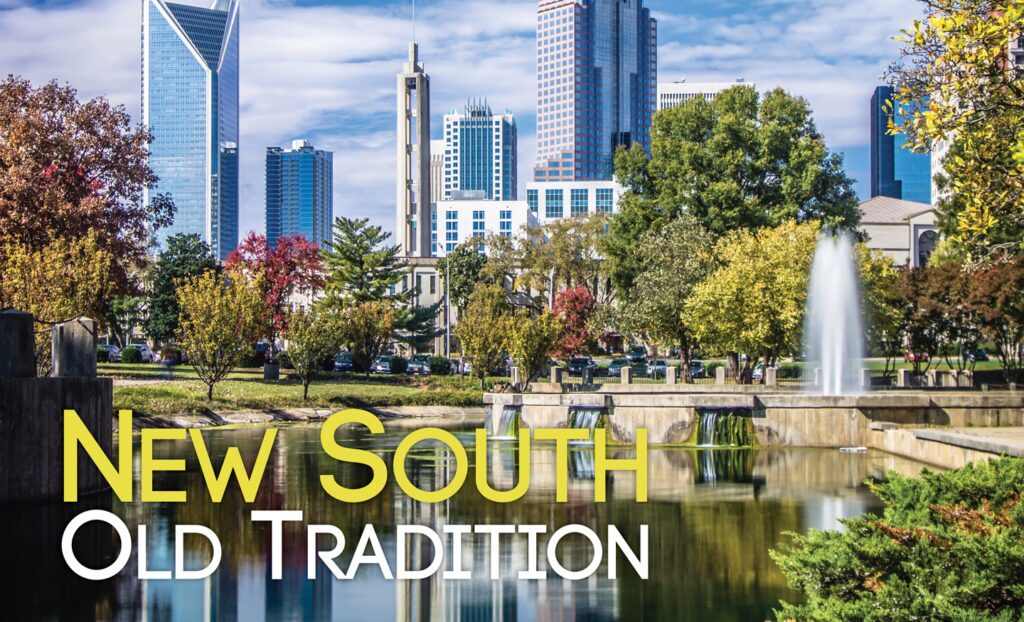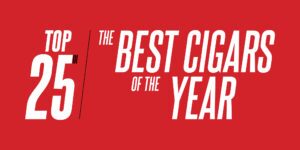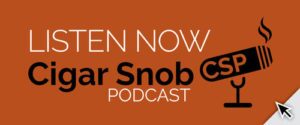Tobacco was once part of the fabric of North Carolina – It is again
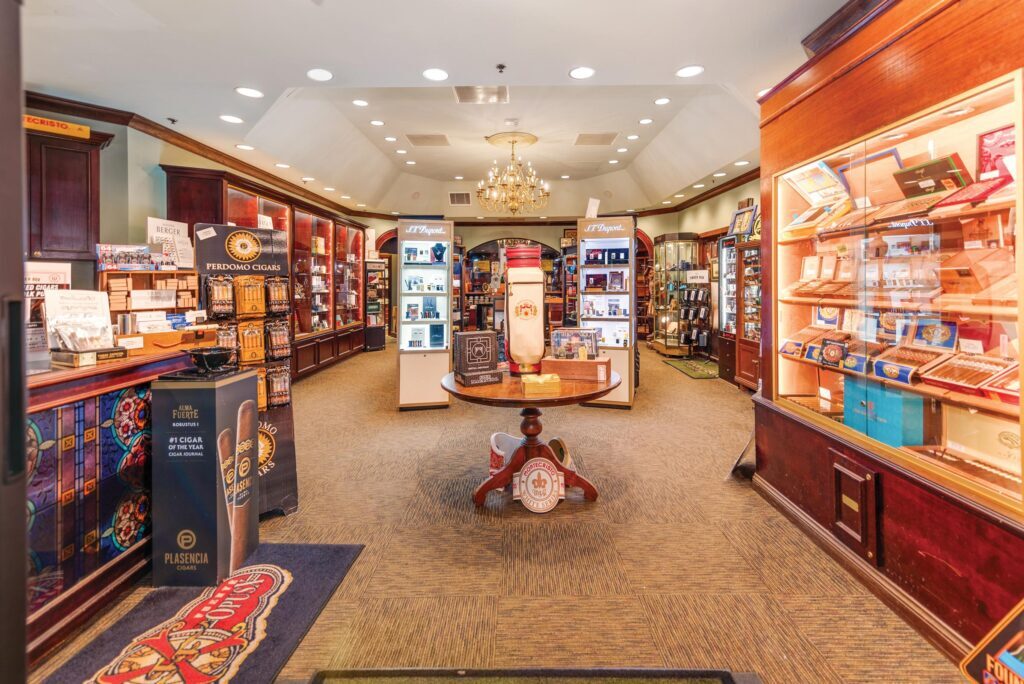
In the Old West, they used to say everyone passes through Albuquerque, New Mexico at one time or another.
In the new South, the same goes for Charlotte, North Carolina.
The city’s airport, Charlotte Douglas International Airport, saw 58 million passengers pass in and through, up 10 percent from the previous year. It is now the 9th busiest airport in the U.S., tied with Miami.
The airport, which veteran travelers know as CLT, is feeding the city and a corresponding thirst for cigars.
“The airport keeps bringing people through here and so many come for events and visits,” says Craig Cass, second generation owner of Tinder Box Cigars.
“[CLT] has made the city an easier place to do business…and that’s driving people here,” Cass says.
Among his visitors, “We get a ton of pilots, they are here all the time. They even come in if they have three or four hours between flights.”
Cass came to Charlotte in 1987 from Winston-Salem, where his father had a pipe and cigar store. While the state’s relationship with tobacco was diminishing via tobacco lawsuits, the younger Cass saw opportunity in cigars and pipes, which were only slightly affected by the national hysteria over smoking.
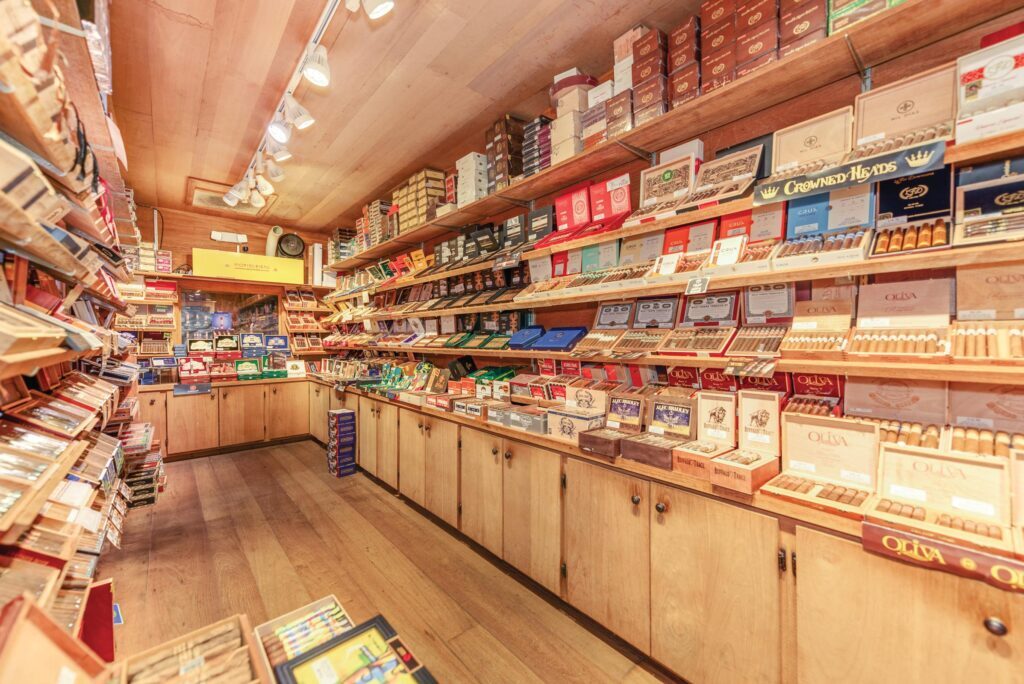
He opened Tinder Box at a local mall and thrived. He was at first on the mall’s ground floor, and in 1996 moved to a more spacious room on the lower level of the mall parking lot. Locating in the mall was a clever move; turns out there were a whole lotta shoppers who wanted some cigars with their cheap cotton and pleather.
“We were here in time for the cigar boom of the 90s, and we’ve been doing well ever since,” Cass says.
New Tinder Box stores slowly popped up around town, first in 2004, then again in 2008.
His locations all offer a room on-site to smoke, which at the main location is a squeezed spot that keeps folks elbow-to-elbow for their conversations. Cass’s main problem during a visit a few weeks after the Premium Cigar Association trade show was to find room for his inventory.
“We sell so many cigars,” he says, “and we always need more. The demand is always there.”
In fact, metro Charlotte offers cigar opportunities in every part of its metro area, extending from the area north of the city, where the Charlotte Motor Speedway was built in 1959, to tony Ballantyne near the South Carolina border.
These operations range from the comfortable retailers like Cass to the full-on liquored-up cigar bars.
“I’m a cigar retailer,” Cass clarifies. While some of the newcomers to the cigar market are retailers, “most are cigar bars now.”
This was fostered by a state law change in 2009, which allowed cigars and alcohol to join under one roof. It opened the door to a new smoking experience and a new clientele.
Today, there is not a part of town where a cigar is more than two miles away.
The dizzying selection and demand obscure the state’s political fall-in-line anti-smoking zealotry. The most apt comparison for the Charlotte region is Florida, which of course revels in the love of cigars and the freedom to indulge almost anyplace.
In a former gas station just off downtown, the Vintage Whiskey and Cigar Bar opened four years ago, prospered, then changed hands last year when it was bought by two local 20-something brothers, Gage and Grayson Wassweiler.
Gage and his brother had talked since they were kids about having their own business.
“I had smoked cigars as kind of a beach thing, an occasion,” Gage says. When Vintage hit their radar, they sprung.
“We knew it was a good opportunity,” says Gage, who is a software engineer. “We wanted more than a bar. [Cigars] were a passing interest at one point, but I love them now.”
The Vintage’s 3,400 square feet includes a wide outdoor patio, a full bar, a private lounge for its 100 premium members, and a generous humidor. It’s managed to maintain its cigar-centricity despite its location in a younger-tilted neighborhood. “About 95 percent of our visitors smoke cigars,” says Louie Ely, an assistant general manager at Vintage who has worked for several area cigar retailers and lounges.
Ely said more retailers were adding lounges and getting liquor licenses.
“It’s revenue, and [alcohol] is often part of the fabric of the experience,” he says.
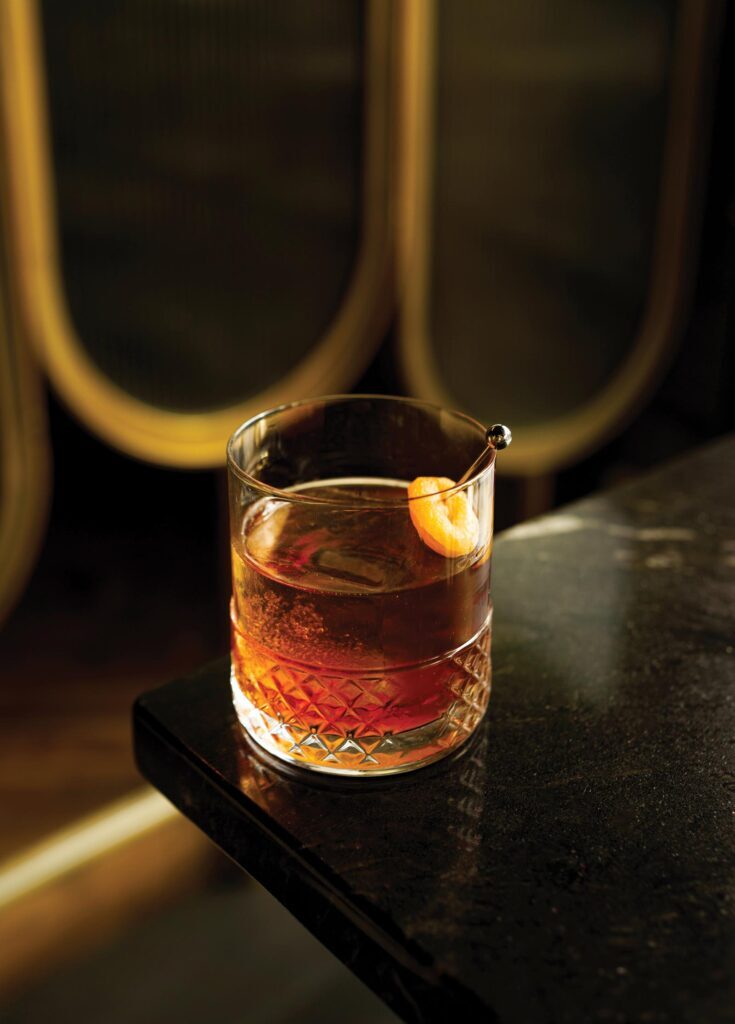
A few blocks north, Charlotte Cigar Culture has added a cooler of beer, a few bottles of spirits and called it good. It’s between a retailer and a bar, with comfy, weathered chairs, a members-only space with more chairs and a domino table, and a booze option. It’s a cigar bar lite, housed in a repurposed jewelry store, opened in 2011, with its former showcases now humidors on each side of the stand-alone storefront.
Behind a small, handmade bar the cooler offers an ambitious selection of bottled and canned beer, some white wine, with an adjacent bar holding some liquor.
“We aren’t really a bar at all,” says Dean, an employee and New York City transplant who is working the counter on a weekday afternoon. He fields a steady stream of customers, all regulars, who buy their cigars, chat briefly, and leave.
Tourists come into Cigar Culture when there are downtown events, especially something at the football stadium, home to the NFL’s Carolina Panthers and Charlotte Football Club, part of Major League Soccer, which is within walking distance.
“Those are the times we tend to see a little more alcohol,” Dean says. “But they still buy cigars.”
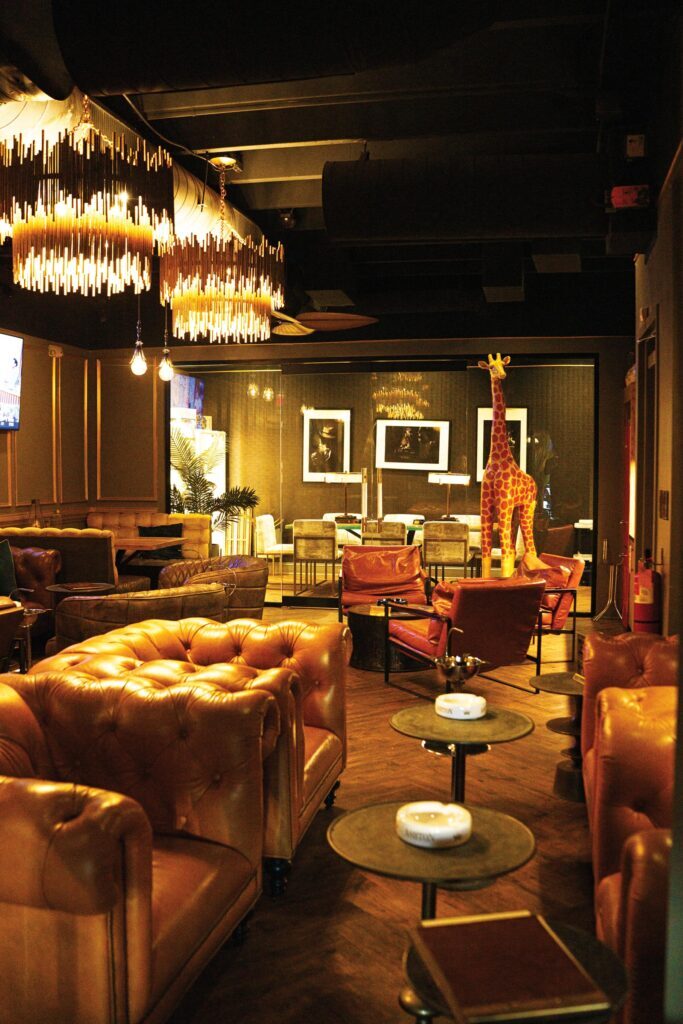
Photo Credit: The Vintage Whiskey & Cigar Bar of Charlotte
Some patrons take their cigars and sit on the patio to the side of the building, which has a corner lot and is shaded by two large willow oaks.
In keeping with the repurposing building practice, Cigar Culture owner Larry Good opened another store in 2013, 105 Cigars, in an old bank in Mathews, a southern suburb. The vault is the humidor.
While Charlotte buzzes with cigar options, the city is also home to one of aviation’s most iconic aircraft: the jet from Sully’s “Miracle on the Hudson.”
In January 2009, US Airways Flight 1549 took off from New York’s LaGuardia Airport headed to CLT when it struck a flock of geese 90 seconds into the flight. With both engines disabled, Capt. Chesley “Sully” Sullenberger safely glided the Airbus A320 onto the Hudson River, saving all 150 people aboard.
The dented but intact aircraft now resides at the Sullenberger Aviation Museum, which opened last year near CLT. Step out of your car in the parking lot and you’ll catch the scent of jet fuel—the building sits just off the airport’s major east runway. Along with a touching exhibit devoted to Flight 1549, a grandstand on the museum grounds gives visitors a front-row view of takeoffs and landings.
The museum also explores the state’s aviation history, including replicas of the Wright brothers’ early 20th-century aircraft flown at Kitty Hawk, about 400 miles east on the Atlantic coast.
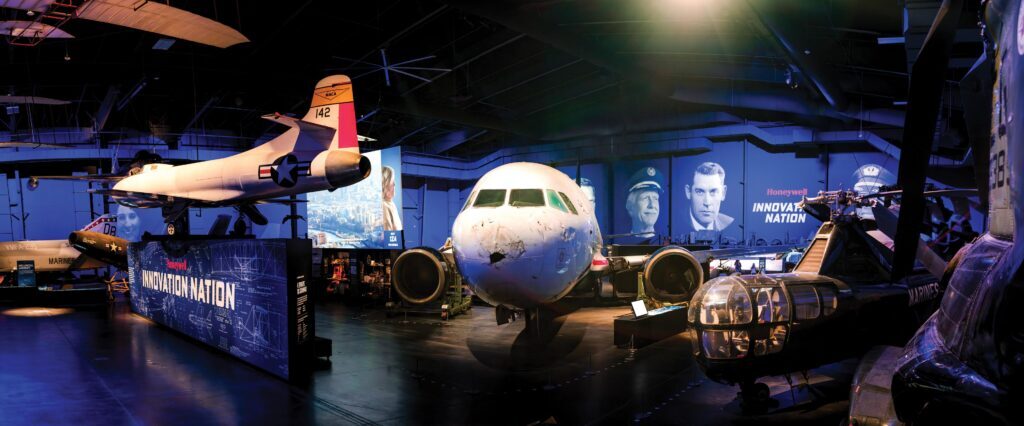
Photo Credit: Sullenberger Aviation Museum
Not far from the airport, the Billy Graham Library documents the journey of the homegrown evangelist. It’s set on 20 acres of greenery, three miles from where Graham lived as a youth. Now restored, his original family home sits on the library grounds.
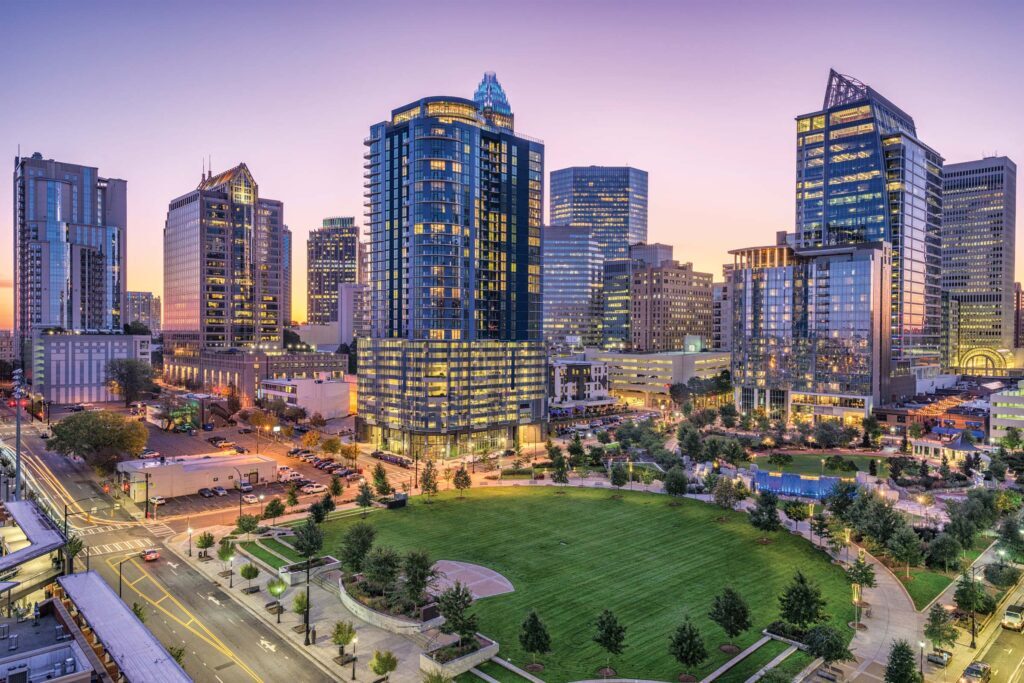
Photo Credit: Adobe Stock/SeanPavonePhoto
These cultural landmarks work together with the top-tier professional sports, an arts theater that brings in Broadway productions and a continued stop for marquee pop music acts in keeping Charlotte relevant. The town has doubled in population since 2000, to nearly a million people.
“The city has a strong economic identity – it’s the second-largest banking hub in the U.S. behind New York City – that’s helped drive consistent population growth for decades,” U.S. News & World Report said in its 2024-2025 Best Places to Live rankings. “…The city’s essence is perhaps better captured in its diverse neighborhoods and suburban areas, each of which has its own style and flair.”
That’s both correct and confusing; it’s hard to tell the neighborhoods apart. Is this Dilworth or South End? Is Uptown considered downtown? And was it just luck that the edge city of SouthPark is also the name of one of the best animated series in history?
The commercial areas merge with the terraced lawns of the residential streets, and like most metro areas that have seen brisk growth, the traffic is constant and heavy.
The rapid expansion has its downside.
There is no Charlotte-esque food and part of the reason for that lies in the city’s origin. Charlotte named itself the Queen City after Queen Charlotte, wife of King George III, upon its incorporation in 1768 to please the British monarchy, which ruled the Colonies.
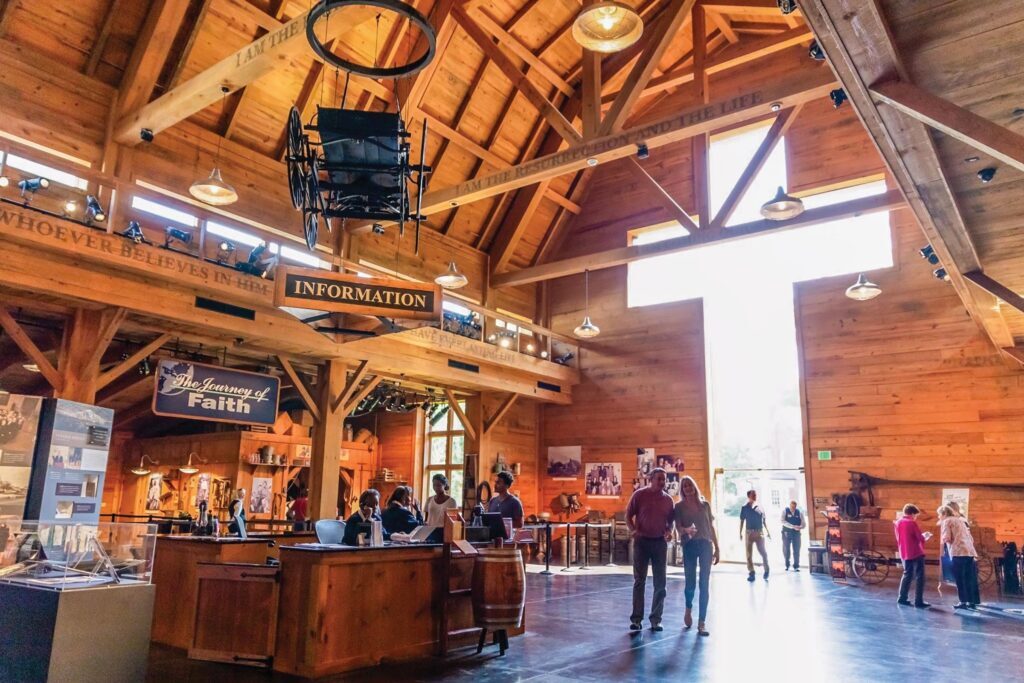
Photo Credit: Charlotte’s Got a Lot
While British rule ended, the Queen City moniker stuck. Charlotte would forever appease the very country that is infamous for its lacking cuisine, not to mention its namesake being likewise described as “plain.”
Some locals will vaguely refer to North Carolina barbecue (although that falls to the conversation wayside once they find you call Texas home), but the city does deliver a variety of high and low food.
And people drive to food – it was suggested that one hit the road 45 minutes north to Haps Grill in Salisbury for a hot dog – reported to be best in the state – but Comet Grill right in Charlotte offers what is presented as real Carolina hot dog style, which is two dogs grilled with chili, mustard, onions and cole slaw.
That’s as Charlotte as we can get.
The best offerings come from the abundance of corporate names, including Ruth’s Chris Steak House, Morton’s, Capital Grille, Fleming’s and The Palm.
The Palm’s 14 U.S. locations vary on smoking policy, but this one is a good one. General Manager Joey Profeta has been there for 30 years, and the small, 10-table terrace provides sanctuary, where you can snack and smoke.
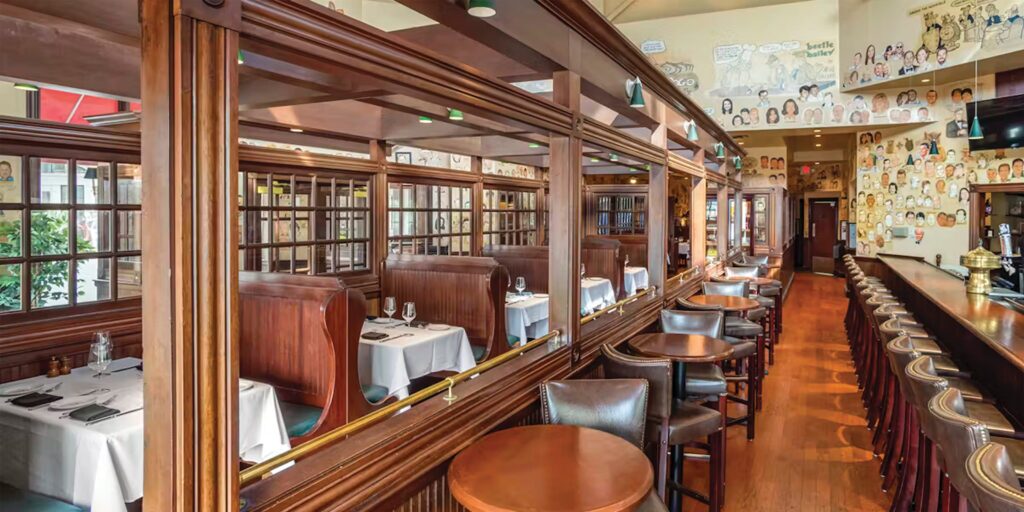
We pull a Montecristo No. 2 from the small greatest hits humidor, order a glass of Butcher’s Choice Pinot Noir and a plate of salt and pepper tuna and have the whole patio to ourselves.
While the food is a McAmerica blur of the same eateries you’ll find from Seattle to Orlando, where Charlotteans get their cigars and how they consume them has never been more varied.
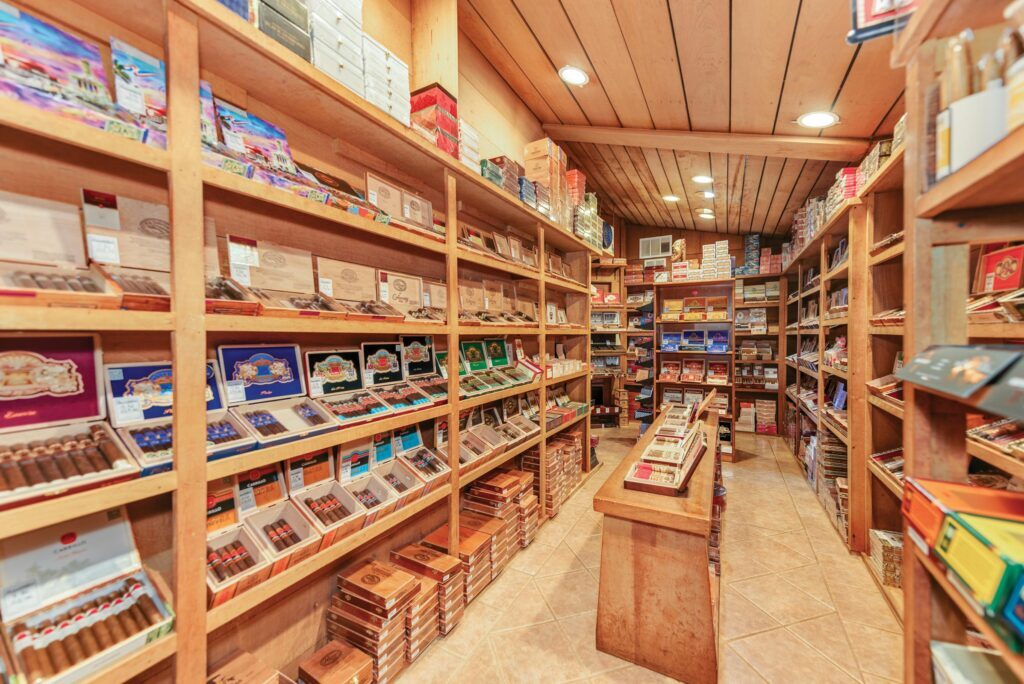
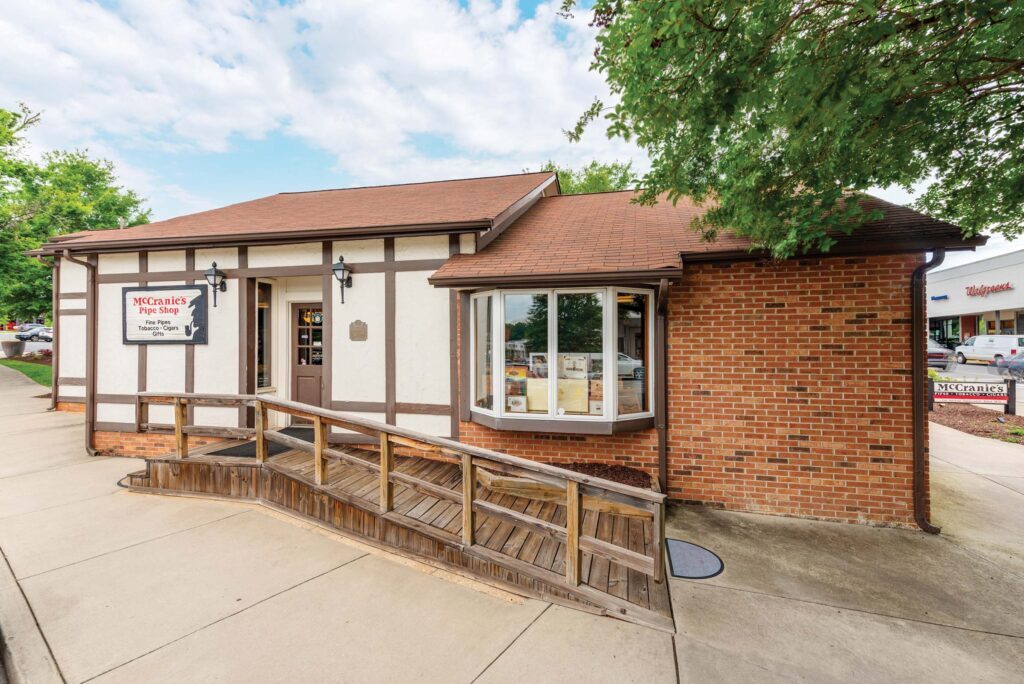
In a strip mall parking lot south of downtown sits a 60s-era, mock Tudor house, decidedly out of place in a modern plaza featuring a Walgreens, Michaels, and an AMC theater among a few dozen other storefronts.
The old-world design is, of course, common for tobacco stores. But in bustling Charlotte, in the middle of a shopping center parking area, it’s an original.
As is Todd McCranie, who has operated McCranie’s Pipe Shop out of the house for 45 years. He is understated and quiet, much like his well-appointed, comfortable but modest shop.
The shopping center has been there for 55 years and when McCranie’s contractor father moved the family from Florida to North Carolina in 1979, he wanted to open a pipe store. He sought a good, busy location, and the operator of the strip mall was open to interesting ideas. The elder McCranie suggested the house be done in a dated style. The place has been there ever since.
“We knew the Newmans in Tampa (of J.C. Newman Cigar Company), so my dad knew cigars,” Todd McCranie says, although his father favored pipes. “Premiums were big in Tampa but not so much in North Carolina. We had a humidor from day one.”
The strategy was to place the store in the middle of shopping sprawl, where it couldn’t be missed. The McCranies didn’t want a smoking area or lounge, just a place where people could get the cigars and pipe tobacco they wanted. Nearly all his customers are regulars, McCranie says.
“We are willing to pay the extra for real estate in these very busy areas,” McCranie says. “And we want to just keep it to retail. We understand that in a shopping center, they wouldn’t allow smoking.”
In 2010, McCranie opened City Cigar Co., again in a shopping center, with a view of Best Buy and a Pearle Vision optician’s store out the front door.
In May, a second City Cigar Co. opened. Among its neighbors are a Target and a Petco. He launched these with little hoopla, no balloons, no specials.
“Last time we opened a new location, maybe we did direct mail,” he says laconically. McCranie didn’t attend the opening, leaving that to his son, the third generation in the business.
The ability for them to expand, slowly, is rooted in the old real estate maxim, “location, location, location.” “I don’t really share that too much,” McCranie says. “But it works.”
While McCranie’s is a placid place to grab and go, the cigar scene downtown is garish, amidst the high rises, sports arenas and entertainment venues.
Tailored Smoke Cigar Lounge and Havana Smoke and Reserve both serve up cigars for the nightlife denizens of urban Charlotte. Both are within a giant’s jump shot from the NBA Charlotte Hornets’ arena as well as several of the city’s premier luxe hotels.
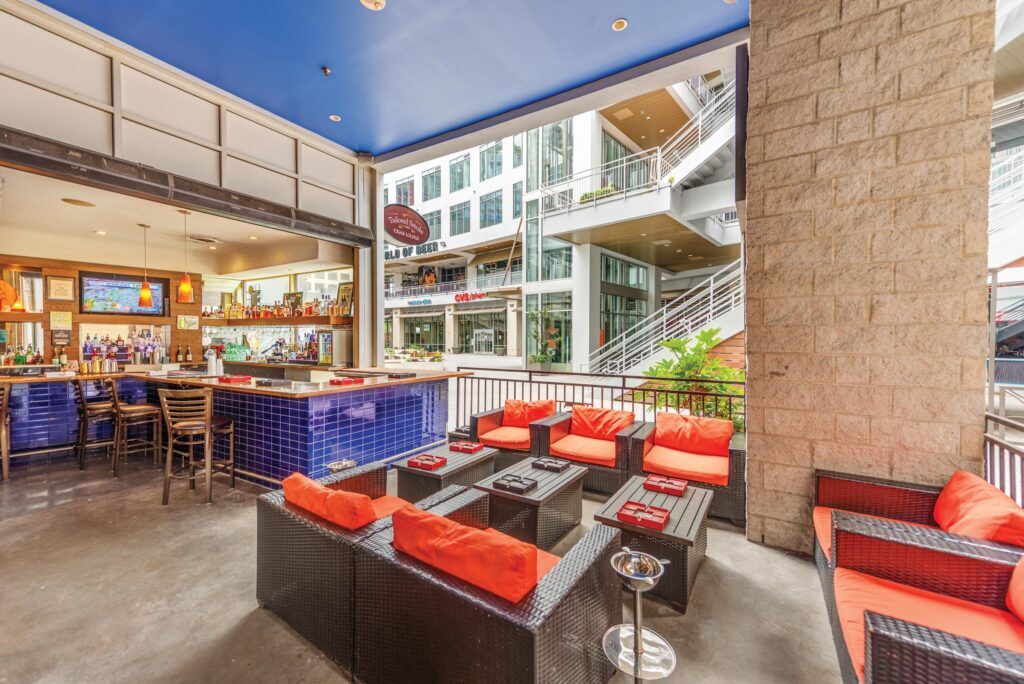
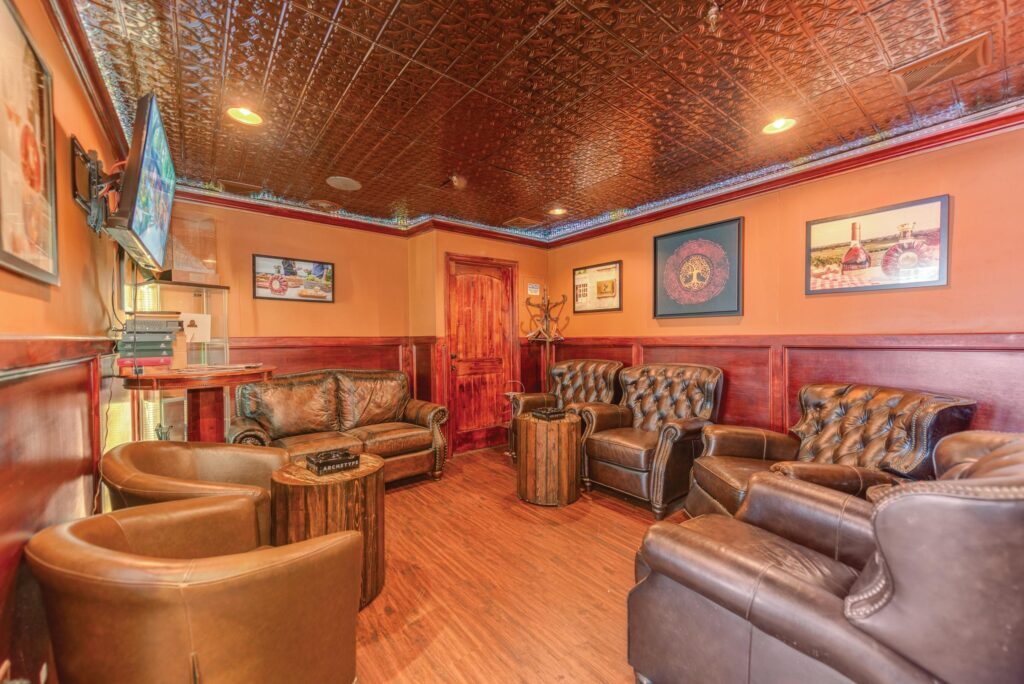
Havana features a half-circle bar, a reasonable humidor and a rooftop bar one story up. It features tables for smoking and socializing, a tight space with sometimes-booming music.
At Tailored, roughly 35 percent of its sales are cigars with 40 percent coming from alcohol and the rest in memberships and accessories. Tailored, with concrete floors and a porch, brings in a DJ on weekends and features live comedy every other week.
Are they bars with cigars, or are they lounges?
“The myth is that Tailored Smoke is a lounge first with a bar to complement the cigars,” says Preston Gray, who opened his downtown location seven years ago. “We really try to make sure we carry some good cigar brands. But we don’t have an extensive selection of liquor, just something that will be a good choice for the cigar they choose.”
Tailored Smoke downtown became so popular that Gray quit his career as an executive with Michelin, and five years ago opened another location 16 miles north of downtown in Concord, three miles from the Charlotte Motor Speedway.
It was there that the hypercompetitive and evolving cigar lounge model got his attention.
In Concord, his hope was that he could embrace a more traditional lounge, going in the other direction of his downtown store.
“I’m a traditional cigar lounge guy,” he says. “When I first got here, though, two more places opened up and they had entertainment.”
Like most of Charlotte, there are many cigar options. Put “cigar lounge” in a Google Maps search inside Tailored in Concord, and you get seven hits within ten miles of varying veracity. Expand that geographic line and you get more.
“The market forced me into the entertainment,” he says. “I was a purist.”
In that regard, the demand for cigars and experiences that are taking shape in Charlotte would change for some the allure of a quiet, thoughtful space of conversation into a noisy, bustling scene.
McCranie and Cass have built small cigar empires based on retail, regulars and knowing their customers. It’s a traditional, perhaps more deliberate part of Charlotte and its cigars.
McCranie’s first move to expand in 2010 was an experiment, especially considering the move to more lounges and bars.
“But,” McCranie says, “we felt the demand was there and it worked out more quickly than I thought.”
Establishments with the alcohol and the night clubby atmosphere are also an important part of the city’s cigar fabric.
The city’s relative cigar newcomers, with nightlife energy, rooftop bars, DJs and booze, reflect an upstart crowd as it relates to cigars. Some of these patrons will continue to smoke cigars even as their taste for loud and bustling wanes.
Then they’ll head over to McCranie or Cass.
Gray at Tailored, with his heart in the traditional, straddles both worlds.
“I was anti-entertainment,” he says, referring to the emerging model that he could not ignore. “I recognize there is a need for people to have experiences. The traditional cigar shop isn’t about the experience other than the transaction. I want to have something relational.”
He looks around his Concord location, with its low slung, comfortable leather couches and decorative wall art, one piece featuring Gray’s noble aim: “Tailored Smoke Cigar Lounge will be known throughout the industry for providing an unparalleled cigar experience…”
There are no losers in the cigars of Charlotte, or any city that is experiencing a “cigar boom.” Both elements, the traditional and the fresh, have room to work, tethered by the leaf.
You can be a local plumber, attorney or professor, or a tourist dropping in for a Hornets game and find what you want. “I feel like anything that is good for anybody’s business is good for everybody’s,” Cass says. “It’s very important to have cigar bars that are healthy. But I like my concept and would not change it for anything.”

